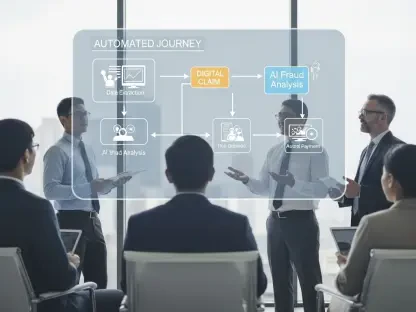Artificial intelligence continues to redefine industries, and Vijay Raina is at the forefront of this transformation. As an expert in SaaS and software, Vijay provides profound insights into the evolving landscape of technology tools, including those designed for autonomous AI agents. In this interview, Vijay explores the current trends in seed-stage investments, the impact on enterprise customers, and the future of AI applications that independently conduct tasks traditionally performed by humans.
Can you explain the current trend in seed-stage investment for AI autonomous agents?
The seed-stage investment for AI autonomous agents is experiencing a significant boom. Investors are recognizing the potential of these agents to revolutionize industries by automating tasks that previously required manual effort. As a result, there has been a remarkable increase in funding directed towards startups developing these technologies, indicating a strong belief in their future impact.
Why do you think there is such a significant focus on autonomous AI agents for enterprise customers?
Enterprise customers are keen on AI autonomous agents because they offer a transformative approach to productivity. Unlike traditional tools that assist humans in performing tasks, autonomous agents have the capability to execute these tasks independently, thus potentially saving time and resources. This shift enables companies to focus their human workforce on more strategic initiatives, pushing AI to the forefront of operational improvements.
How do you compare the current AI trend to the SaaS boom that began in the mid-2000s?
The AI trend mirrors the SaaS boom in several ways, primarily in the shift towards empowering enterprises with technology that enhances productivity. However, while SaaS provided the tools to perform jobs better, AI autonomous agents promise to undertake those jobs themselves. This represents a bold evolution, moving from assistance to autonomous execution, showcasing a future where AI could significantly alter the operational landscape.
In what ways are these new AI applications different from previous productivity-enhancing tools?
Previous productivity tools were largely aimed at improving human efficiency, acting as aids in various tasks. AI applications differ by offering complete autonomy in task execution, minimizing human intervention. These agents can process information and make decisions independently, proving valuable for tasks where efficiency and precision are paramount, fundamentally altering how businesses approach productivity.
What has been the role of startups in advancing the development of autonomous AI agents?
Startups play a crucial role by innovating rapidly and pushing boundaries in AI technology. They are often the trailblazers, creating versatile applications and challenging existing paradigms. With seed-stage investments flowing in, startups are incentivized to explore unique AI solutions that could disrupt traditional industries, thus driving forward the development and adoption of autonomous agents.
Could you provide an overview of the funding landscape for seed-stage AI companies this year?
The funding landscape for seed-stage AI companies is vibrant, with substantial investments being channeled into technologies that demonstrate potential for automation and independence. This year, around $700 million has been invested in AI seed rounds, underscoring the faith investors have in these companies’ ability to innovate and transform industries through autonomous agents.
Why do you think some seed-stage funding rounds for AI companies are unusually large?
Large funding rounds for AI companies typically reflect strong investor confidence in the transformational impact these technologies can have. The size of these investments is a testament to the perceived value of developing autonomous agents that can redefine business operations and efficiency. Additionally, the complexity and development costs of AI solutions often necessitate larger initial investments.
Can you share more details about some of the top funding recipients in this area?
One of the most notable recipients is Lila Sciences, which secured a $200 million investment to advance AI-driven experiments in automated labs. Other prominent startups are Augment and Yutori, both of which aim to automate everyday tasks and enhance business processes. Their substantial funding rounds highlight the expectations for their technologies to deliver meaningful innovations.
How is Lila Sciences using AI to innovate in the life sciences space, and what significance does their $200 million investment hold?
Lila Sciences is utilizing AI to conduct experiments in automated labs, significantly advancing research capabilities by reducing the manual workload. Their $200 million investment underscores the immense potential AI holds in life sciences, particularly in optimizing experimental efficiency and accuracy. This funding positions them to pioneer advancements in the sector, potentially altering traditional research methodologies.
Which other industries do you see benefiting from the development of autonomous AI agents?
Industries such as legal tech, logistics, and manufacturing stand to benefit substantially. Autonomous agents can streamline processes, minimize human error, and improve overall productivity. In legal tech, for instance, AI can handle data processing tasks, while logistics may see enhanced efficiency in operations from AI teammates managing shipments. Manufacturing can benefit from automation in production lines.
What are some of the specific tasks or roles that AI agents are being developed to handle?
AI agents are being crafted to manage tasks like data analysis, customer service, logistics coordination, and even complex decision-making processes. They are advancing into roles traditionally occupied by humans, aiming to provide more accurate and expedient results without the fatigue or bias that might affect human workers.
How do you envision the role of AI in automating aspects of desk work and everyday tasks?
I envision AI significantly transforming desk work by undertaking repetitive and time-consuming tasks, thus freeing humans to focus on creative and strategic roles. Everyday tasks like scheduling, data entry, and basic customer interactions could be seamlessly automated, offering unprecedented efficiency and allowing human workers to concentrate on innovative or complex problem-solving activities.
Can you elaborate on the types of tools and technologies that are enabling the spread of automated agents?
Technologies such as machine learning, natural language processing, and cloud computing are pivotal in the development of autonomous agents. These tools allow AI to learn from data, understand and respond to human language, and deploy applications at scale. Such advancements make it feasible for agents to operate independently and effectively across various sectors.
Why are logical, factual tasks considered prime areas for early success for AI startups?
Logical tasks are data-driven and relatively straightforward, making them ideal for AI applications that excel in processing information and executing decisions based on clear criteria. Startups focusing on these areas can more easily leverage existing datasets to train AI, driving early achievements and building credibility for their autonomous technologies.
In which sectors do you see AI agents gaining initial traction and why?
Legal tech and coding are prominent sectors where AI agents are gaining traction due to their reliance on vast amounts of data and repetitive processes. The inherent structure and requirements of these industries align well with AI’s capabilities, allowing for efficient automation and accuracy in task execution.
How do you see the balance between logical and subjective considerations affecting AI decision-making?
Balancing logical and subjective elements is crucial for effective AI decision-making. While AI excels in logical scenarios, integrating subjective considerations requires advanced algorithms capable of context comprehension and nuance. Achieving this balance ensures AI’s recommendations resonate more closely with human intuition and judgment.
What challenges do you foresee for AI agents when it comes to tasks requiring subjective judgment?
AI agents struggle with subjective tasks due to the ambiguity and complexity involved. Human intuition and experience often guide decisions where data alone may not suffice. Developing AI that can mimic these cognitive abilities is challenging, as it requires nuanced understanding and the ability to adapt to intricate and dynamic scenarios.
How are companies evaluating the effectiveness of voice AI agents like those being developed by Phonic?
Companies evaluate these voice agents by analyzing their ability to accurately interpret and respond to human queries. Metrics such as response time, accuracy, and user satisfaction help gauge their effectiveness. Voice agents are assessed based on their capability to enhance customer interactions and streamline communication without losing personal touch.
Could you share insights on the potential overlap between AI and legal tech or coding?
The overlap is pronounced, as both legal tech and coding benefit from AI’s proficiency in handling large datasets and automating complex processes. In legal tech, AI can manage document analysis, case research, and prediction outcomes, while in coding, it can optimize development processes, detect errors, and suggest improvements, accelerating productivity in both fields.
How do you see the future of seed-stage funding shaping up, particularly for AI autonomous agents and similar technologies?
I see seed-stage funding continuing to grow as the potential applications for AI autonomous agents expand. As these technologies prove their worth across various industries, investor confidence will likely increase, fostering financial backing for companies that spearhead innovation. The ambition and scalability of AI applications will keep driving significant investment opportunities in this sector.









